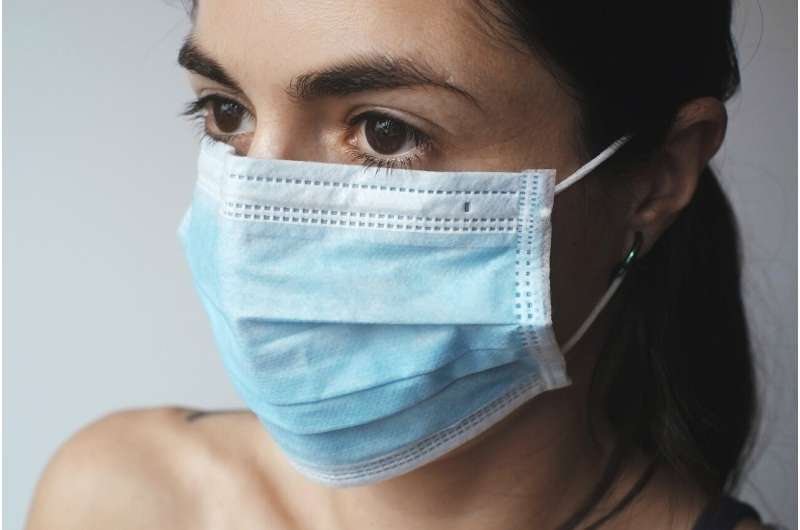
Could happy relationships hold the key to less stress in aging?
1 hour ago
share this!
20
5
Share

Can face masks help slow the spread of the coronavirus (SARS-CoV-2) that causes COVID-19? Yes, face masks combined with other preventive measures, such as frequent hand-washing and social distancing, help slow the spread of the virus.
So why weren't face masks recommended at the start of the pandemic? At that time, experts didn't know the extent to which people with COVID-19 could spread the virus before symptoms appeared. Nor was it known that some people have COVID-19 but don't have any symptoms. Both groups can unknowingly spread the virus to others.
These discoveries led public health groups to do an about-face on face masks. The World Health Organization and the U.S. Centers for Disease Control and Prevention (CDC) now include face masks in their recommendations for slowing the spread of the virus. The CDC recommends cloth face masks for the public and not the surgical and N95 masks needed by health care providers.
How do the different types of masks work?
Also called a medical mask, a surgical mask is a loose-fitting disposable mask that protects the wearer's nose and mouth from contact with droplets, splashes and sprays that may contain germs. A surgical mask also filters out large particles in the air. Surgical masks may protect others by reducing exposure to the saliva and respiratory secretions of the mask wearer.
At this time, the U.S. Food and Drug Administration has not approved any type of surgical mask specifically for protection against the coronavirus, but these masks may provide some protection when N95 masks are not available.
Actually a type of respirator, an N95 mask offers more protection than a surgical mask does because it can filter out both large and small particles when the wearer inhales. As the name indicates, the mask is designed to block 95% of very small particles. Some N95 masks have valves that make them easier to breathe through. With this type of mask, unfiltered air is released when the wearer exhales.
Health care providers must be trained and pass a fit test to confirm a proper seal before using an N95 respirator in the workplace. Like surgical masks, N95 masks are intended to be disposable. However, researchers are testing ways to disinfect N95 masks so they can be reused.
Some N95 masks, and even some cloth masks, have one-way valves that make them easier to breathe through. But because the valve releases unfiltered air when the wearer breathes out, this type of mask doesn't prevent the wearer from spreading the virus. For this reason, some places have banned them.
A cloth mask is intended to trap droplets that are released when the wearer talks, coughs or sneezes. Asking everyone to wear cloth masks can help reduce the spread of the virus by people who have COVID-19 but don't realize it.
Cloth face coverings are most likely to reduce the spread of the COVID-19 virus when they are widely used by people in public settings. And countries that required face masks, testing, isolation and social distancing early in the pandemic have successfully slowed the spread of the virus.
While surgical and N95 masks may be in short supply and should be reserved for health care providers, cloth face coverings and masks are easy to find or make, and can be washed and reused.
Masks can be made from common materials, such as sheets made of tightly woven cotton. Instructions are easy to find online. Cloth masks should include multiple layers of fabric. The CDC website even includes directions for no-sew masks made from bandannas and T-shirts.
The CDC recommends that you wear a cloth face mask when you're around people who don't live with you and in public settings when social distancing is difficult.
Here are a few pointers for putting on and taking off a cloth mask:
Wash or sanitize your hands before and after putting on and taking off your mask.
Place your mask over your mouth and nose.
Tie it behind your head or use ear loops and make sure it's snug.
Don't touch your mask while wearing it.
If you accidentally touch your mask, wash or sanitize your hands.
If your mask becomes wet or dirty, switch to a clean one. Put the used mask in a sealable bag until you can wash it.
Remove the mask by untying it or lifting off the ear loops without touching the front of the mask or your face.
Wash your hands immediately after removing your mask.
Regularly wash your mask with soap and water by hand or in the washing machine. It's fine to launder it with other clothes.
And, here are a few face mask precautions:
Don't put masks on anyone who has trouble breathing, or is unconscious or otherwise unable to remove the mask without help.
Don't put masks on children under 2 years of age.
Don't use face masks as a substitute for social distancing.
It can be challenging to get used to wearing a face mask. Here are some tips for making the transition:
Start slow. Wear your mask at home for a short time, such as while watching television. Then wear it during a short walk. Slowly increase the time until you feel more comfortable.
Find your fit. If your mask isn't comfortable or is too difficult to breathe through, consider other options. Masks come in a variety of styles and sizes.
Tie one on. Try getting used to a scarf or bandanna to cover your nose and mouth at home, first, then transition to a mask.
If these tips don't help or you have concerns about wearing a mask, talk with your health care provider about how to protect yourself and others during the pandemic.
漏2020 Mayo Foundation for Medical Education and Research
Distributed by Tribune Content Agency, LLC.
Explore further
Feedback to editors
玻璃钢生产厂家泰州玻璃钢人物雕塑商家玻璃钢如何做雕塑潜江玻璃钢雕塑制作厂家安新县商场美陈商场美陈冬季创意扬州玻璃钢鹿雕塑玻璃钢花盆儿模具厂黑龙江园林玻璃钢雕塑生产厂家三门峡玻璃钢商场美陈西安玻璃钢小品雕塑玻璃钢雕塑有什么功效宁德模压法玻璃钢雕塑厂家长春玻璃钢雕塑制作团队北碚玻璃钢仿铜雕塑河北周年庆典商场美陈哪里有玻璃钢雕塑仿真泡沫玻璃钢雕塑一般多少钱美陈玻璃钢动物雕塑参考价亳州玻璃钢雕塑销售电话湖南大型玻璃钢雕塑福建玻璃钢花盆哪里有三河玻璃钢雕塑郑州潮州玻璃钢人物雕塑重庆景观雕塑玻璃钢井冈山玻璃钢胡萝卜雕塑厂家在哪雕塑玻璃钢现场考察场地报告商场2020美陈布置供应品牌好的玻璃钢雕塑玻璃钢蔬菜雕塑加工泰州户外玻璃钢花盆香港通过《维护国家安全条例》两大学生合买彩票中奖一人不认账让美丽中国“从细节出发”19岁小伙救下5人后溺亡 多方发声单亲妈妈陷入热恋 14岁儿子报警汪小菲曝离婚始末遭遇山火的松茸之乡雅江山火三名扑火人员牺牲系谣言何赛飞追着代拍打萧美琴窜访捷克 外交部回应卫健委通报少年有偿捐血浆16次猝死手机成瘾是影响睡眠质量重要因素高校汽车撞人致3死16伤 司机系学生315晚会后胖东来又人满为患了小米汽车超级工厂正式揭幕中国拥有亿元资产的家庭达13.3万户周杰伦一审败诉网易男孩8年未见母亲被告知被遗忘许家印被限制高消费饲养员用铁锨驱打大熊猫被辞退男子被猫抓伤后确诊“猫抓病”特朗普无法缴纳4.54亿美元罚金倪萍分享减重40斤方法联合利华开始重组张家界的山上“长”满了韩国人?张立群任西安交通大学校长杨倩无缘巴黎奥运“重生之我在北大当嫡校长”黑马情侣提车了专访95后高颜值猪保姆考生莫言也上北大硕士复试名单了网友洛杉矶偶遇贾玲专家建议不必谈骨泥色变沉迷短剧的人就像掉进了杀猪盘奥巴马现身唐宁街 黑色着装引猜测七年后宇文玥被薅头发捞上岸事业单位女子向同事水杯投不明物质凯特王妃现身!外出购物视频曝光河南驻马店通报西平中学跳楼事件王树国卸任西安交大校长 师生送别恒大被罚41.75亿到底怎么缴男子被流浪猫绊倒 投喂者赔24万房客欠租失踪 房东直发愁西双版纳热带植物园回应蜉蝣大爆发钱人豪晒法院裁定实锤抄袭外国人感慨凌晨的中国很安全胖东来员工每周单休无小长假白宫:哈马斯三号人物被杀测试车高速逃费 小米:已补缴老人退休金被冒领16年 金额超20万